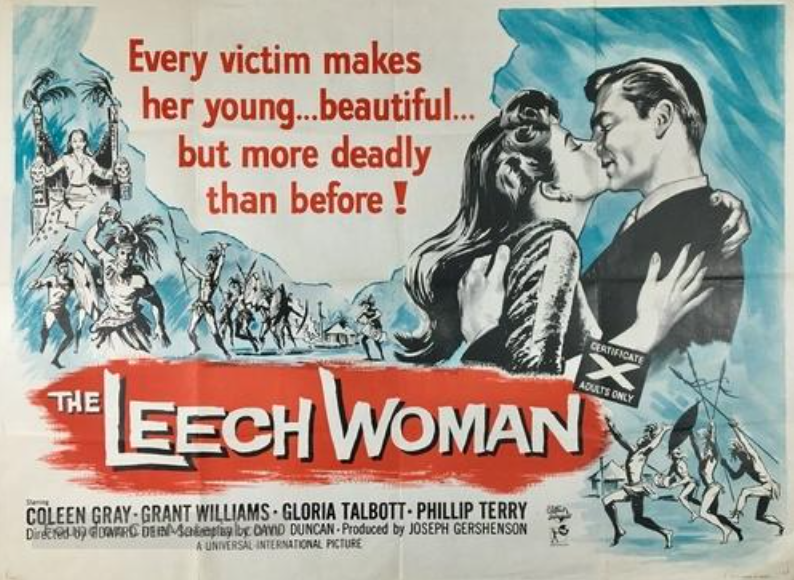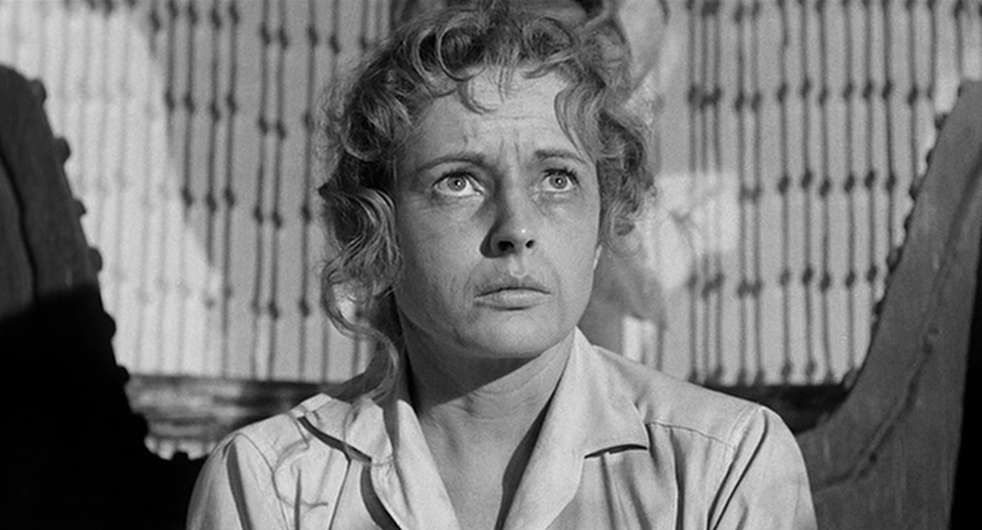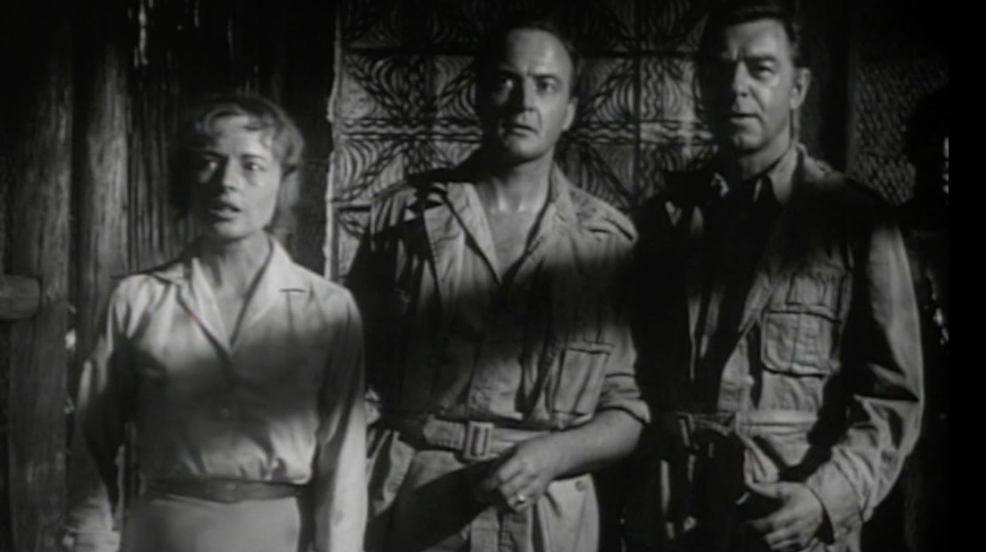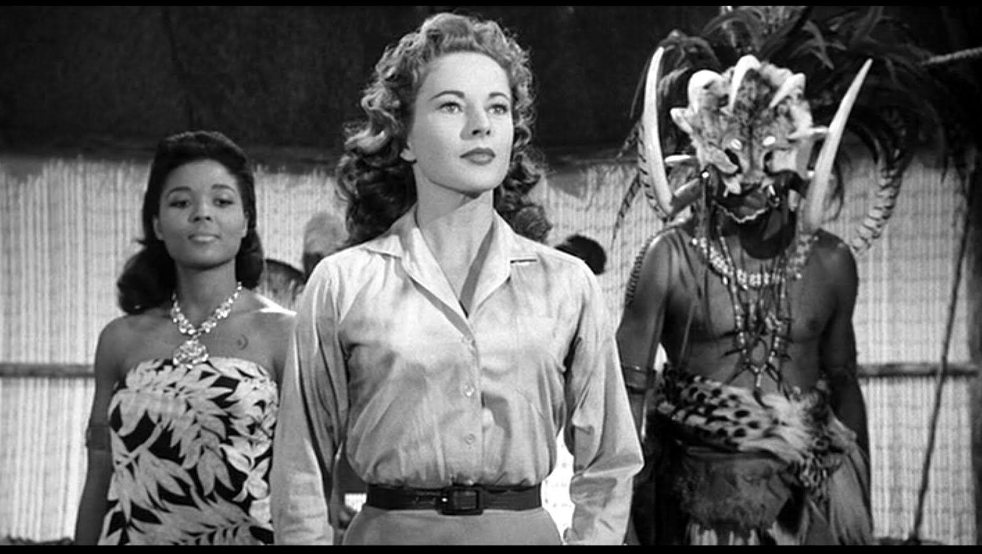[Editorial] Exploring sexism, ageism, and toxic relationships with The Leech Woman (1960)
Ageism is nothing new to society, particularly from the female perspective. It affects all genders, but is specifically more challenging for women who statistically do more to “cover up” signs of age such as gray hairs, fine lines and wrinkles, age spots, etc. as a societal norm. The Leech Woman goes for the throat (and more specifically, the pineal gland) on this topic with surprising pathos, struggles with self-worth, toxicity and even anger that are jolting from a low-budget “B” film from 1960 that was shot in a mere ten days and has been mostly forgotten about except to be infamously mocked on the comedy spoof show Mystery Science Theater 3000 (“The Leech Woman.” Mystery Science Theater 3000, created by Joel Hodgson, Season 8, Episode 2, Best Brains, 1997).
The viewer is immediately thrust into the toxic marriage between a middle-aged endocrinologist, Dr. Paul Talbot (Phillip Terry), and his alcoholic and mentally-abused wife, June (brilliantly portrayed by Coleen Gray). Paul’s obsession is finding a way to make women, specifically, young again.This is laid out before June (who is 10 years his senior and wealthy) while he complains about his disgust for older women as he pulls out a bottle of whiskey and goads his forlorn wife into drinking with the hopes that she will finally grant him a divorce. He says, amongst his tirade of abuse to June:
“I resent the word ‘butchering’ almost as much as I resent looking at you. I don’t know why you came here today, but whatever it was, speak up and get out!! [...]. Go on home.Call Neil and tell him to start the proceedings. Tell him to use any grounds, whatever he wants. Just let him get on with it.”
June, who clearly loves her husband and makes the viewer painfully aware of her anguish, takes the bait and the shots of whiskey with the promise of divorce and is shooed away by her husband and his nurse Sally (Gloria Talbott) to call Sally’s fiance and lawyer Neil (Grant Williams) and begin divorce proceedings. The bleakness is thick and powerful and little is needed aside from the excellent performance by Coleen Gray as June to convey her desperation, disappointment, and hopelessness at failing to be young and beautiful enough for her husband and the aching need to be loved. As fate would have it, an elderly African woman named Malla stops June after her phone call to meet Neil and declares:
“Mrs. Talbot, you will never divorce your husband. You won’t have to. He will die. His death will give you life, a new way of life. [...] You are the one in my dreams of blood!”
Malla - in keeping her appointment with Dr. Talbot after her chilling prophecy to his wife - has a secret, a powder that can slow the aging process - something Dr. Talbot desperately desires. After seeing the effects of the powder, a special refined form of a rare flower called Nipe that grows in Africa and is sacred to her tribe, Malla promises to give the powder to Dr. Talbot if he will finance her way back to Africa so she can die in peace amongst her tribe from which she was stolen before being sold into slavery over 100 years prior. She promises that there is another ingredient - a secret of her tribe that she claims is unknown to her - that can be mixed with the powder and actually reverse the aging process. He, of course, agrees and sends Malla on her way and comes home to a drunken and paranoid June with lawyer Neil trying to calm her down. Talbot is able to comfort her in one fell swoop, professing his love for June and putting a stop to the divorce, igniting the chance for June to win his love as they take a trip to Africa to “begin anew” as “he can’t possibly do it without her”. As the viewer, it is clear that Talbot is up to something, but for the long-suffering June, she believes in this chance and believes that love can happen, finally, for her.
As if mental and emotional abuse were not potent enough, Talbot and June travel to Africa with Talbot reverting back to being cold and abusive to the disappointed June, but stressing how “important” she is to him. They hire a reluctant guide to direct them to the tribe (in a particularly insensitive portrayal of African culture) and June insists on leaving for home when she realizes that her husband only deems her “important” because he plans to make her a test subject for the reversal of the aging process and his desire for her to be younger and inspire his love for her. They are captured by the tribe and Malla - a very important person to the tribe - grants them their lives and the chance to see the age reversal process, but they must die when she does in order to keep the secret. The secret in question is that Malla must mix the powdered flower Nipe with a man’s pineal gland juice to become young and beautiful again, killing the man in the process with a ceremonial ring to extract the pineal gland’s secretions. Despite the terrible and yet typical depiction of Africa in this low-budget film - made only to accompany the major attraction film The Brides of Dracula (1960) - it succeeds as an early push in feminism and, unfortunately, portrays how giving women power makes them “evil”, a sadly common theme throughout history. It is, however, important to note that the newly-young and striking Malla gives June the option to experience this regeneration herself and lets her choose any of the men of the tribe to sacrifice for his pineal gland while also cautioning her that the regeneration doesn’t last long. June, giving the viewer perfect satisfaction, chooses her abusive husband and immediately has his pineal juice drained and her youth and beauty restored.
This being a United States film from 1960, unfortunately the white guide plans to steal the ceremonial ring and the Nipe powder while killing off the African tribe. It would be remiss to not address the racism, the film’s only major (but glaring) flaw. “The Leech Woman’s portrayal of Africa is pretty typical of Hollywood in this era [...] mystical rites with wildly gyrating natives, references to indigenous tribes as ‘savages’, stock wild animal footage, and ‘good’ locals escorting the outsiders who either die or flee in terror. [But] despite this parade of cliches and stereotypes, the Malla character is an intelligent, well-spoken, classy lady - the type of Black person not often seen in horror films of this era.” (Anonymous. “The Leech Woman (1960).” Black Horror Movies. Blackhorrormovies.com.}
Without spoiling the rest of the film in which the titular “Leech Woman” emerges to keep her youth and beauty (and, subsequently, her own image of self-worth after being worn down by mental cruelty and abuse from her husband), this “Poverty Row” film has surprising depth and is not the “creature feature” horror film it is often bundled with in the $5 bin at the local Walmart. The only “monster” here is a society that devalues aging women and the lengths a mentally-devolving woman will go to in order to feel loved, accepted, and valued. The character of Malla is empowered and attempting to empower June and it is a crime that the film’s title refers only to June as its’ “monster” - in fact, all adverts for the film cash in on this. The true horror here is something of an existential crisis to all of us as women - getting older.
What was true in 1960 is still very true in today’s culture of Instagram and Snapchat filters, social media, and readily available plastic surgery: aging women are valued little, youth and beauty are praised above all things - including intelligence, and a compliment (that I often fall prey to at almost 43 years old) is that I “don’t look my age”.
I urge readers to seek out this surprisingly astute “forgotten” horror film and evaluate for themselves who the real villain or villains are. This film is ripe with feminist issues and a good springboard for feminist discussions.
“In age relations, as in many other oppressive paradigms, the relationship between self and identity as a consequence between discourse and power. [...] youthful women are seen as sexier than aging women. Feminism cannot deny ageism as a central issue, because on the whole, society is kinder on older men than it is on older women.” (Samiezade-Yazd, Safa. “Ageism is a Feminist Issue.” Feministing, 2011, Feministing.com.}






![[Editorial] Soho Horror Film Festival: Interview with Aimee Kuge on Cannibal Mukbang](https://images.squarespace-cdn.com/content/v1/5fe76a518d20536a3fbd7246/1701808004722-9M8SZ2UXY52QBQBR4NTI/img20230818_15150780.JPG)
![[Editorial] 9 Horror Nintendo Switch Games To Play](https://images.squarespace-cdn.com/content/v1/5fe76a518d20536a3fbd7246/1697214470057-3XZXX8N4LYIMDFWS6Z3P/Screenshot+2023-10-13+at+17.20.13.png)
![[Mother of Fears] Mothering in Silence in A Quiet Place (2018)](https://images.squarespace-cdn.com/content/v1/5fe76a518d20536a3fbd7246/1696445921315-HZJ2DZYQIH6VVWXBO2YL/Screenshot+2023-10-04+at+19.52.29.png)
![[Event Review] Highlights from Mayhem Film Festival 2023](https://images.squarespace-cdn.com/content/v1/5fe76a518d20536a3fbd7246/1697624582491-MPT2VB9RRGU6OG7L6UKL/Mayhem+2023.jpg)
![[Editorial] Mayhem Festival: Interview with Thomas Sainsbury on Loop Track (2023)](https://images.squarespace-cdn.com/content/v1/5fe76a518d20536a3fbd7246/1697186472899-WC4RR0TW7L7LMFEBGPA2/Tom+Sainsbury.jpg)
![[Editorial] Keeping Odd Hours: A Retrospective on Near Dark (1987)](https://images.squarespace-cdn.com/content/v1/5fe76a518d20536a3fbd7246/1696445070868-HU9YIL3QPBCL1GW47R3Z/Screenshot+2023-10-04+at+19.36.53.png)
![[Editorial] 5 Female Focused Horror Book Recommendations](https://images.squarespace-cdn.com/content/v1/5fe76a518d20536a3fbd7246/1696441981361-52EQCTJ7AT2QF1927GM7/919xtm6d3fL._AC_UF894%2C1000_QL80_.jpg)
![[Editorial] What to Watch at This Year's Cine-Excess International Film Festival 2023](https://images.squarespace-cdn.com/content/v1/5fe76a518d20536a3fbd7246/1697213510960-REV43FEOZITBD2W8ZPEE/Screenshot+2023-10-13+at+17.01.15.png)
![[Editorial] Cherish Your Life: Comfort in the SAW Franchise Throughout and Beyond the COVID-19 Pandemic](https://images.squarespace-cdn.com/content/v1/5fe76a518d20536a3fbd7246/1695487675334-MYPCPYYZQZDCT548N8DI/Sc6XRxgSqnMEq54CwqjBD5.jpg)























![[Editorial] 10 Films & Events to Catch at Soho Horror Film Fest 2023](https://images.squarespace-cdn.com/content/v1/5fe76a518d20536a3fbd7246/1700819417135-299R7L4P0B676AD3RO1X/Screenshot+2023-11-24+at+09.41.52.png)
![[Editorial] 9 Best Slashers Released Within 10 Years of Scream (1996)](https://images.squarespace-cdn.com/content/v1/5fe76a518d20536a3fbd7246/1695478839037-LOFHGVM3H6BMSZW7G83M/Screenshot+2023-09-23+at+15.15.11.png)
![[Mother of Fears] Mother Vs. Monster in Silent Hill (2006)](https://images.squarespace-cdn.com/content/v1/5fe76a518d20536a3fbd7246/1695485781119-H6GNP0G3J2TLPAOIABV7/Screenshot+2023-09-23+at+17.11.56.png)
![[Editorial] 9 Terrifying Cerebral Visions in Horror Movies](https://images.squarespace-cdn.com/content/v1/5fe76a518d20536a3fbd7246/1693509801235-X23OL50T1DVGECH0ZJK2/MV5BMjQ0MTg2MjQ4MV5BMl5BanBnXkFtZTgwMTU3NDgxMTI%40._V1_.jpg)
![[Mother of Fears] I Don’t Wanna Be Buried in a Pet Sematary (1989) and (2019)](https://images.squarespace-cdn.com/content/v1/5fe76a518d20536a3fbd7246/1691328766069-QFNAVJOMFZVZ5CLU1RWM/Screenshot+2023-08-06+at+14.23.13.png)
![[Mother of Fears] How I Love to Love Nadine in The Stand (2020)](https://images.squarespace-cdn.com/content/v1/5fe76a518d20536a3fbd7246/1690213172707-TKM9MZXK02EVCIX30M1V/Screenshot+2023-07-24+at+16.29.11.png)
![[Editorial] 11 Best Werewolf Transformations in Horror Films](https://images.squarespace-cdn.com/content/v1/5fe76a518d20536a3fbd7246/1689240234098-HUPQC6L57AAHFJNT8FTE/Screenshot+2023-07-13+at+10.09.13.png)

Now it’s time for Soho’s main 2023 event, which is presented over two weekends: a live film festival at the Whirled Cinema in Brixton, London, and an online festival a week later. Both have very rich and varied programmes (with no overlap this year), with something for every horror fan.